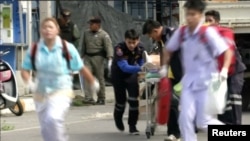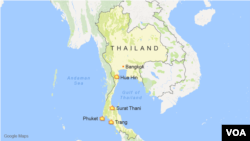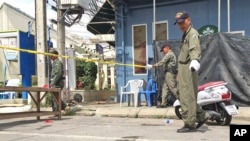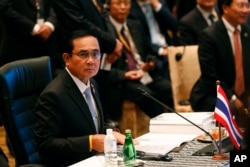Thailand's valuable tourism industry is reeling after a series of bombs and arson attacks Friday killed four people and injured at least 30 people, many of them foreign visitors.
The 12 attacks across southern Thailand's beach resorts came as the country marked the 84th birthday of Queen Sirikit, a national holiday. Some of the attacks were at the seaside town of Hua Hin, where the royal family has a residence.
A nationwide investigation is under way and police say they have arrested two men. They call the bombings "acts of sabotage," and not foreign terrorism. No group has immediately claimed responsibility for the attacks.
The police also say the attacks do not appear to be linked to a low-level insurgency in Thailand’s southern border provinces with Malaysia, that has gone on since 2004.
Panitan Wattanayagorn, a security adviser to the Thai government, said the attackers had a clear motive. “They want to destabilize the situation which is more and more stable as we move toward the third stage of the (political) roadmap. Certain suspects have been detained. I think the authorities will move very quickly to expand the search and investigation.”
The focus of the attacks were major popular tourist destinations in Trang, Prachuap Khiri Khan, Phuket, Phang Nga, and Surat Thani provinces.
In Hua Hin, streets were deserted Friday after the overnight and early morning coordinated attacks, with tourists warned to remain indoors at their hotels.
A spokeswoman for the Centara Grand Beach Resort Villas, who did not wish to give her name, said the resort had tightened security, amid a climate of unease along the southern tourist provinces.
“Normally, Hua Hin is a safe place and this is the first time for a bomb like this. At this moment, not only Hua Hin, I think in the southern part of like Phuket and the province that was bombed, I watched the news, it’s quite serious now in the southern part of Thailand. And of course it will have an effect for tourism, for sure,” she said.
Tourism is a key driver of the Thai economy, which has slowed down to about three percent annual growth. With around 30 million visitors a year, tourism contributes almost seven percent to national output and employs some 5.5 million people.
The attacks also come less than a week after voters backed a military-supported constitution that opens the way to fresh elections, a key step in the military’s political plan since taking power in May 2014.
Under the new charter, the military will appoint a 250-member Senate. Along with the 500 members of the House of Representatives, the Senate will elect a new prime minister. Political analysts say this could lead to the appointment of a non-elected leader, possibly from the military.
Diminished political parties
Both major political groups – the Pheu Thai party – overthrown in a coup in May 2014 led by current prime minister, Prayut Chan-o-cha, and the Democrat Party, will face diminished roles in the new government.
Kraisak Choonhavan, a member of the Democrat Party, said the attacks appeared to be political and symbolic because of the Queen's birthday holiday.
“This has to be the other opposition (Pheu Thai), which stands to lose for five years because the constitution states quite clearly that the selection of the prime minister will come from both the upper and lower houses” of Parliament, Kraisak said.
But Sunai Pasuk, the Thailand representative for Human Rights Watch, while condemning the attacks, said no conclusions should be drawn over who was responsible until the investigation is complete.
“The situation remains fluid, so there needs to be close collaboration between the public and the authorities and people should exercise extreme caution in southern Thailand,” Sunai said.
The embassies of the United States, Britain, Australia and Japan all issued fresh warnings to their nationals to exercise caution when visiting tourist areas.













